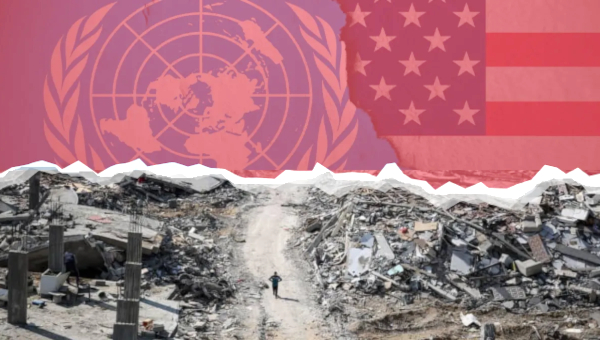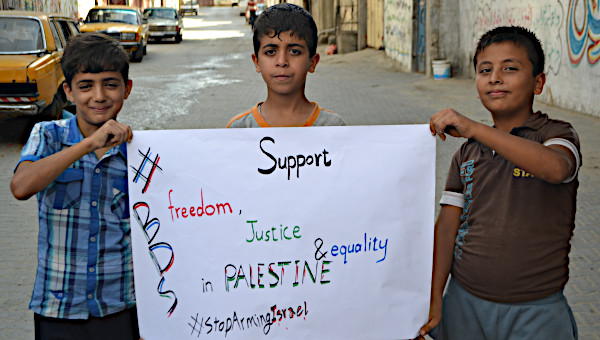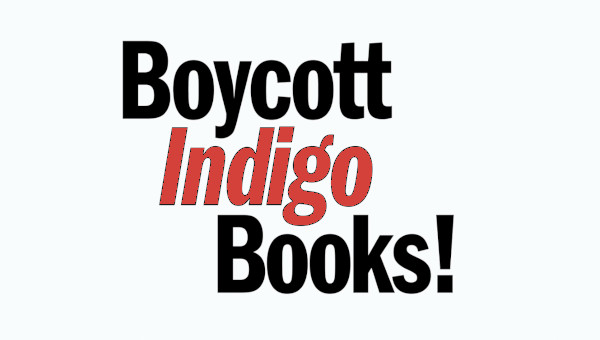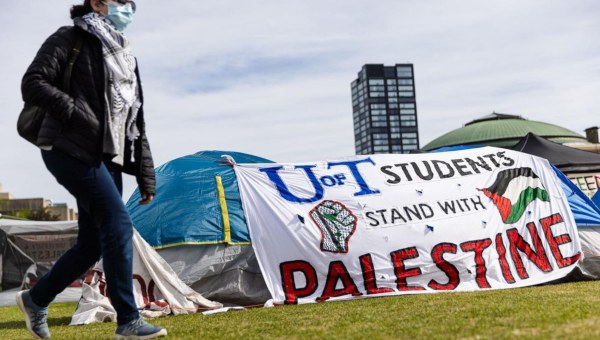Next Steps for the Palestinian Solidarity Movement
The following article is an updated version of a talk given in Toronto on October 4, at the launch of the book Between the Lines: Readings on Israel, the Palestinians, and the U.S. “War on Terror” (Haymarket Books, 2007) edited by Tikva Honig-Parnass and Toufic Haddad.
The launch of this book is an extremely timely and important contribution to understanding the current situation in Palestine. We all know from the daily reports that this situation is one of the most difficult ever faced by the Palestinian people. In the Gaza Strip, a truly unprecedented assault on the population is unfolding. Over 1.4 million Gazans are trapped in this ‘open-air prison,’ subject to daily bombardment by Israeli rockets and heavy artillery. Israel has announced plans to cut electricity and fuel supplies to the Strip. These supplies are absolutely necessary to maintaining basic services such as hospitals and sewage treatment plants. We now regularly hear stories of Gaza residents being killed in floods of sewage, as Israel prevents needed supplies and inspections of sewage lakes in the area.
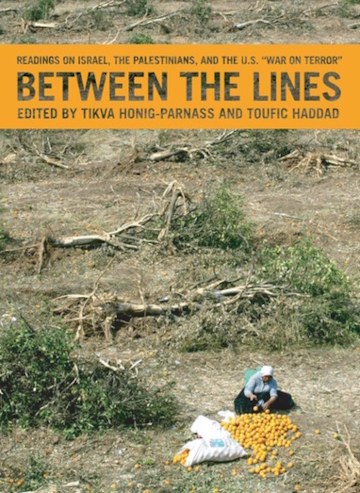
The point here, however, is not to focus on the current situation in the West Bank and Gaza Strip. The enormous value of the book lies in the political perspective it outlines. We need to build upon these perspectives and present an assessment of the current stage of our solidarity efforts in places such as Canada and the USA. It is very important that we always situate our efforts historically, take a step back to look at where we are at and where we want to be going.
Return to Oslo?
Much of the mainstream media has attempted to present the current situation as a re-run of the early 1990s. We are told that the U.S. and EU are rolling up their sleeves to bring the Palestinian and Israeli sides to the negotiating table in late November. Both Mahmoud Abbas and Ehud Olmert are said to be trying to move this process forward but are faced with the recalcitrance of “extremists on both sides”. Both sides will have to make “painful sacrifices”. But – if done right – we can return to the good old days of the Oslo peace process and eventually see the establishment of a Palestinian state living “alongside a secure Israel.”
Naturally, as with the mainstream media coverage of just about everything, this picture is designed to confuse and obfuscate the real situation on the ground. All the talk of negotiations, peace, and painful compromises is designed first and foremost to solidify apartheid in the West Bank and Gaza Strip. It’s very important that we understand this message. When the Oslo agreement was signed in 1993 it created enormous confusion within the Palestinian national movement and the solidarity organizations outside. This was an agreement that was sold to the world as a plan for a Palestinian state, yet in reality it aimed at creating the very situation we see today on the ground. Palestinians herded into isolated Bantustans surrounded by settlements, walls, checkpoints with their movement controlled by permits.
The talk of peace and negotiations is designed to hide the reality of an apartheid agreement. Israel is trying to find someone who will sign away the rights of the people – most fundamentally the right of return of Palestinian refugees. This is what is going on now. It is not a “civil war” between Hamas and Fatah, or media fantasies about the supposed emerging Islamic state in Gaza.
The 1993 Oslo Accords killed the solidarity movement for seven years. Many people here today were involved in these earlier solidarity movements across North America and can attest to the collapse that happened in the early 1990s. This situation didn’t reverse until the people once again rose in the second Intifada in September 2000. That uprising re-sparked the solidarity movement.
But the situation today differs significantly from the early 1990s. In many respects we are in a much stronger situation today than that earlier period. This is obviously a testament to the resilience and struggle of the Palestinian people. But it is also due to the work of those in the solidarity movement who did keep fighting throughout the Oslo years, and understood from the outset the real nature of the Oslo agreement.
We need to keep this message clear in the coming period. U.S.-sponsored ‘peace’ plans, backed by some of the client Arab states in the region, will not achieve liberation. The Palestinian people will completely reject any self-appointed leader that attempts to relinquish their rights, the bedrock of which is the right of return of Palestinian refugees. This is not a fringe or ‘radical’ position but is the fundamental outlook of the Palestinian people as a whole. A very important confirmation of this fact occurred in Canada in late October, over 54 delegates representing virtually every Palestinian community organization across Canada unanimously adopted an open-letter to Mahmoud Abbas warning him of the “disaster” of the Oslo Accords and the complete rejection of the upcoming U.S.-supported summit in Annapolis, Maryland.
Not Just the West Bank and Gaza Strip
One thing that gives us strength today is the widespread understanding that the struggle for justice is not solely a question of what happens in the West Bank and Gaza Strip. The aim of the Oslo project was to reduce our struggle to negotiating over bits of land in these areas. Today we see the reality of this – those bits of land are nothing but open-air prisons where we see Palestinian prison guards but Israel continues to hold the keys to the cell.
But today we see that the Palestinian people reject that division. Most importantly, we see the growing movement of Palestinian citizens of Israel who are demanding equal rights in a state that has been built on racism and settler-colonialism. Over the past year, four separate declarations by Palestinians from inside Israel have expressed this demand. In response to these declarations, the head of the Israeli intelligence, Yuval Diskin, called Palestinian citizens of Israel a “strategic threat” and issued a veiled warning that any one attempting to organize around the demand of simple democracy would face the repressive arm of the state.
Israel cannot countenance the simple demand for equal rights for Palestinian citizens because it is a state built on racism. Leaders of the Palestinian community have been arrested and kept under administrative detention orders without charge or trial. The head of the National Democratic Assembly (NDA) party and elected member of the Israeli parliament (the Knesset), Azmi Bishara, was forced to flee Israel because he was threatened with imminent arrest. On 30 October, in scenes reminiscent of the West Bank, Israeli police attacked a village in the Galilee village with live ammunition, injuring 40 residents, three of them seriously. And the calls from prominent Israeli academics that describe the Palestinian population inside Israel as a “demographic threat” are getting ever louder.
A barrage of new laws attempt to solidify Israeli racism and silence the growing movement of Palestinians inside Israel. One of these is a law that will prevent anyone who travels to what is deemed an “enemy state” from running for the Israeli parliament. This law is explicitly aimed at Palestinian parties such as the NDA that maintain strong ties with Arab countries. Moreover, in one of the most Orwellian measures ever adopted by the Israeli state, an October 2007 law requires all school children to sign Israel’s “Declaration of Independence”: a declaration that explicitly upholds Israel’s character as a “Jewish state”. Imagine any other country that required every child to sign a document supporting the privileged rights of one ethnic or religious group? As Azmi Bishara has pointed out, Palestinians attending Israeli schools are required to sign a document that negates their very existence!
The emerging movement of Palestinians inside Israel is a very important development and cause for optimism. These Palestinians are an integral part of the Palestinian people as a whole. Their struggle strikes the very nature of Israel as an exclusionary, racist state and shows that Israeli apartheid is not just a question of what happens in the West Bank and Gaza Strip. We must continually strengthen our solidarity with their efforts and struggle.
No to Normalization
Today the strength of our movement rests upon the widespread acceptance that there can be no normalization with Zionism and Israeli apartheid. The basic principle of our movement is that the way to winning justice is not through ‘dialogue’ or ‘joint projects’ or empty calls for ‘peace.’ Rather, justice will be won by isolating the Israeli state and all those who support it.
This is a big shift from fifteen years ago when many people bought into the Oslo myth and normalization with Israel was all the rage. A lot of money was thrown at these projects, hundreds of NGOs sprung up dedicated to dialogue and the ‘peace process.’ But today there is virtual unanimity among the solidarity movement. The way forward is through a sustained campaign of boycott, divestment and sanctions (BDS) against Israeli apartheid. This runs against any attempt to normalize relations with the oppressor.
The call for boycott, divestment and sanctions that came from Palestine in 2005 is very clear. The Israeli state must be isolated in the manner of South African apartheid until three conditions are satisfied: the Israeli occupation of all Arab lands is ended; there is full equality for Palestinian citizens of Israel; and the refugees are allowed to return home. These three demands encapsulate the Palestinian experience since 1948: a people who have been uprooted from their land and prevented from returning home. Our struggle is not just in the West Bank and Gaza Strip, but also to end the racist nature of the Israeli state and allow the refugees to return.
It is important to stress that the BDS call is not something that suddenly appeared in 2005. For decades, the core of the Palestinian struggle has always held a position of ‘anti-normalization.’ To work with and normalize relations with the Israeli state and its supporters means to give consent to one’s own oppression. Rather, we should act to isolate and reveal the structures that hold power in place. The need is not for ‘dialogue’ because the problem is not a lack of understanding. To claim otherwise serves only to justify the existing power structures. More simply: there is an oppressor and an oppressed, and peace will only come through winning justice.
The struggle is not between Jewish people and Palestinians. Anti-Zionist Jews and Israelis are prominent activists and leaders of the solidarity movement, including inside Israel. The solidarity movement is totally clear on this point and to claim otherwise is only to engage in slander. Indeed, Between the Lines was co-written by an anti-Zionist Jewish Israeli who has spent many decades working alongside Palestinians in support of justice. The central question is one of racism and settler-colonialism not religious conflict. The BDS call is aimed at Israeli state institutions and their supporters. Our goal is a state where anyone can live regardless of their religious beliefs or ethnicity.
Canadian Support for Israel
In Canada, we have an important role to play in this global campaign to isolate the Israeli state. The Canadian government is one of the strongest international supporters of Israeli apartheid in the world. Canada was the first country in the world to cut aid to the Palestinian Authority following the elections of January 2006. Canada did this even before the Israeli government.
The Canadian government at all levels has provided full diplomatic support for Israel’s war crimes. Many of us remember that during Israel’s bombardment of Lebanon in 2006, Harper described Israel’s actions as “measured and justified” and opposed calls for a ceasefire. But Harper’s comments are not those of an individual. Across the political spectrum, Canada’s mainstream political parties have given unequivocal support to Israeli policies. In 2005, it was then Liberal Party leader Paul Martin who declared that “Israel’s values are Canada’s values.”
At the economic level, Canada has signed numerous agreements with Israel that serve to strengthen and sustain the Israeli economy. In 1997, the Canadian government signed the Canada Israel Free Trade Agreement (CIFTA). This is the only FTA Canada has signed outside of the western hemisphere. It has been an enormous boon to Israel. From 2000 to 2005, the value of Israeli exports to Canada exceeded Canadian exports to Israel, reversing the trend from the 1990s. Over the same period, average annual Israeli foreign direct investment in Canada exceeded that of Canada in Israel. This is an agreement that has benefited Israel, and helped support the Israeli economy.
Another agreement, the Canada Israel Industrial Research and Development Foundation, provides seed money for Israeli-Canadian research and development. Over 200 companies have been funded by this scheme and the Canadian government now boasts that Israel is its longest standing technology partner. A similar agreement between Ontario and the Israeli government was also signed by Dalton McGuinty and Ehud Olmert in 2005.
Prominent Canadian business leaders have been among the staunchest supporters of the Israeli government. Heather Reisman and Gerry Schwartz are the majority owners of Indigo Books. They set up a fund called the Heseg Foundation for Lone Soldiers that provides scholarships and other support for individuals who have chosen to go to Israel and serve in the Israeli military. In 2006, Reisman and Schwartz attended a ceremony at an Israeli military base where they were awarded the gun of an Israeli soldier killed in Lebanon.
These various forms of support are not surprising given the record of the Canadian government in places such as Afghanistan and Haiti where Canadian troops and other personnel serve to support military occupations. Or the record of large Canadian companies in extracting the resources and wealth of people around the globe. Or the centuries-long attacks against the indigenous people of this land that continues today. This is why the Palestinian solidarity movement also stands with those struggles: we are all strengthened when we fight together.
Ideological Battle
But we should be clear: the campaign of boycott, divestment and sanctions is not about politely asking the Canadian government or business leaders to cut their ties with Israeli apartheid. We must compel them to do so. We know from the South African struggle that those in power will support apartheid until we build a movement large enough to force a change.
Over ten years after the formal end of South African apartheid a certain myth has grown up that says the world was always against the practices of the South African regime. Nothing could be further from the truth. Successive Canadian, U.S. and British governments wholeheartedly backed South African apartheid for decades. The leaderships of Canadian unions proudly championed their links with the apartheid regime and large corporations made millions from their investments in South African apartheid. It took decades of hard work by activists to turn around popular acceptance and support for South African apartheid.
It is important to emphasize that the BDS strategy is fundamentally about winning this ideological battle. No one holds any illusions that Israel will suffer economically at this stage from resolutions and boycott campaigns. Rather, BDS provides a powerful entry point for talking to people about the nature of the Israeli state and the structures that support it in the West. What we are doing is convincing people that Israel – like the South African precedent – is a pariah state that must be isolated. To deal with Israel is something to be ashamed of. We are undermining the ideological support (much of it passive) that allows Israel to continue its horrendous practices against the Palestinian people. For this reason, the BDS strategy cannot be separated from the day-to-day information work we do around Palestine. This information and educational work lays the basis for BDS work. The BDS strategy provides a direction for activity once people understand the reality of the situation.
We have made some very important gains here in Canada. The historic resolution of CUPE Ontario in May 2006 [QandA] in support of boycott and divestment was a turning point. The CUPE Ontario resolution was an outstanding example of how BDS enables us to educate and activate people around Palestine. For the first time in decades, the key issues of the Palestinian struggle were debated on the front pages of Canadian newspapers and on TV and radio stations across the country. Thousands of ordinary CUPE members received information about the campaign or went through workshops and talks explaining why Israeli apartheid should be isolated and ended. The greatest achievement of this resolution was the chance to speak to rank and file CUPE members and build support for Palestine within the union. We can’t underestimate how important this was in helping shift popular consciousness and understanding. This quite simply would not have happened if CUPE had simply passed yet another ‘condemn the violence,’ ‘call for peace’ resolution. Hundreds of thousands of people – that is no exaggeration – were touched by this resolution.
On campuses too, there has been a strong upsurge in understanding the nature of Israeli apartheid. The annual Israeli apartheid week, which began here in Toronto, has expanded globally to cities such as New York, Oxford and Cambridge. In 2007, close to a thousand people attended the week’s activities in Toronto. This coming year promises to be even larger and occur in many more cities across the world.
The campaign to boycott Chapters-Indigo has also been a great success. Regular pickets are happening in six cities across the country. Over 40,000 leaflets have been distributed nationally since the campaign began in January. Heather Reisman’s book reading appearances across the country have been disrupted by activists opposed to her support of Israeli apartheid. Students at a high school in Toronto lobbied their school to pass a resolution to boycott Indigo. Smaller bookstores in Ontario have signed onto the campaign and now carry leaflets and information about Israeli apartheid.
Our next step should be to raise our voices demanding that Canadian governments at both the federal and provincial levels cut their ties with Israeli apartheid. We can call for agreements such as CIFTA, or, here in Ontario, the provincial level agreements with Israel, to be abrogated. We must call for an end to the diplomatic cover provided to Israeli war crimes. The Venezuelan government of Hugo Chavez has shown the way in this regard when they became the first country in the world to withdraw their ambassador from Israel in the summer of 2006.
Conclusion
Israel’s crushing of the population in the West Bank and Gaza Strip and its apparent success in cultivating a Palestinian leadership to return to an Oslo-type process are pyrrhic victories. The real nature of Israel is truly understood by more people than any other point in the last sixty years and support for the Zionist project beyond Western governments and elites is in tatters. Palestinians remain one people: united across refugee camps, the Diaspora, the West Bank and Gaza Strip, and inside Israel itself. All these sectors of the people are moving forward and rejecting normalization with Israel, despite what various self-appointed leaderships might do or say.
This is a time to be very proud of our activities in support of the Palestinian struggle. In years to come, we shall look back on the struggles of today and realize that what we did in the here and now was an integral part of winning justice. This is a struggle that affects the entire people of the Middle East and its outcome will shape the course of history. It is not a struggle that will end tomorrow, but we can be absolutely confident that it is a struggle which we shall eventually win. •


